
International Journal of Science and Mathematics Education
Scope & Guideline
Empowering Educators Through Innovative Research
Introduction
Aims and Scopes
- Interdisciplinary Integration of STEM Education:
The journal emphasizes the integration of science, technology, engineering, and mathematics (STEM) education, exploring how these disciplines can be taught in a cohesive manner to foster deeper understanding and engagement among students. - Teacher Professional Development and Practices:
Research often focuses on the professional growth of educators in mathematics and science, examining effective teaching strategies, pedagogical content knowledge, and teacher beliefs that influence classroom practices. - Student Learning and Cognitive Development:
A significant focus on student learning outcomes, including cognitive and affective dimensions, is evident, as the journal publishes studies investigating how students think, learn, and engage with mathematics and science concepts. - Innovative Instructional Strategies:
The journal contributes to the field by publishing research on innovative instructional methods, such as inquiry-based learning, project-based learning, and the use of technology in education, highlighting their effectiveness in enhancing student engagement and understanding. - Assessment and Evaluation in Education:
Assessment practices in mathematics and science education are a core area of focus, with the journal addressing the development of assessments that accurately measure student understanding and the effectiveness of teaching methodologies.
Trending and Emerging
- Technology-Enhanced Learning Environments:
There is a growing emphasis on the integration of technology in education, including the use of virtual reality, gamification, and online learning platforms, which are increasingly being explored for their potential to enhance student engagement and learning outcomes. - Culturally Responsive Pedagogy:
Research on culturally responsive teaching practices is gaining traction, focusing on how to tailor science and mathematics education to meet the diverse needs of students from various cultural backgrounds, fostering inclusivity and equity. - Social Justice and Equity in Education:
Emerging studies are increasingly addressing themes of social justice and equity within STEM education, investigating how educational practices can be reformed to promote equitable access and representation for underrepresented groups in science and mathematics. - Mental Health and Well-Being in Education:
The impact of mental health on student learning and participation in STEM is becoming a key area of research, with studies exploring how educators can support student well-being alongside academic performance. - Interdisciplinary Curriculum Development:
There is an emerging trend towards the development of interdisciplinary curricula that connect mathematics and science with other subjects, promoting a more holistic approach to education that reflects real-world applications.
Declining or Waning
- Traditional Lecture-Based Instruction:
There is a noticeable decline in studies advocating traditional lecture-based approaches to teaching mathematics and science, as the field increasingly favors active learning strategies that engage students more effectively. - Basic Mathematical Skills Assessment:
Research focusing solely on basic skills assessment appears to be less frequent, reflecting a shift towards more complex assessments that evaluate higher-order thinking and problem-solving skills rather than rote memorization. - Single-Subject Research Studies:
The journal has seen fewer publications centered on single-subject research, suggesting a movement towards more comprehensive studies that address broader educational contexts and interdisciplinary approaches. - Comparative Studies of Teaching Methods:
While comparative studies have been significant in the past, there seems to be a waning interest in this area, possibly due to a shift towards in-depth qualitative studies that provide richer insights into teaching practices. - Standardized Testing Focus:
Research emphasizing the implications of standardized testing on teaching and learning outcomes is becoming less prevalent, as educational discourse shifts towards more holistic and formative assessment practices.
Similar Journals
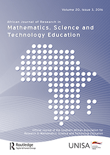
African Journal of Research in Mathematics Science and Technology Education
Exploring New Frontiers in Mathematics and Technology PedagogyAfrican Journal of Research in Mathematics Science and Technology Education is a distinguished academic journal, published by Routledge Journals, Taylor & Francis Ltd, dedicated to advancing knowledge in the fields of mathematics, science, and technology education within the African context. With an ISSN of 1811-7295 and an E-ISSN of 2469-7656, this journal has been a crucial platform for scholarly discourse since its inception in 1997, steadily gaining reputation and impact among researchers, educators, and policymakers. The journal features a rigorous peer-review process, ensuring that high-quality research garners visibility across various disciplines, as evidenced by its Quartile rankings in Computer Science Applications, Education, Engineering, Mathematics, and Physics and Astronomy. With its commitment to serving the educational community and fostering innovative practices, the African Journal of Research in Mathematics Science and Technology Education plays a pivotal role in shaping the future of STEM education in Africa and beyond.
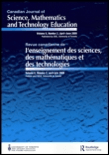
Canadian Journal of Science Mathematics and Technology Education
Advancing STEM Education Through Innovative ResearchCanadian Journal of Science Mathematics and Technology Education (ISSN: 1492-6156; E-ISSN: 1942-4051) is a prominent publication by SPRINGER based in Switzerland, dedicated to exploring innovative methodologies and practices in the fields of science, mathematics, and technology education. Established in 2001 and continuing to 2024, the journal maintains a strong reputation within the academic community, reflected in its Q2 ranking in the Education category for 2023 and a commendable Scopus ranking that places it in the top 25% of journals within the social sciences education domain (Rank #383/1543). This journal serves as a critical platform for researchers, educators, and practitioners interested in the latest developments, research findings, and discussions pertaining to instructional strategies and curricular advancements. Although it is not open access, the journal's insights and contributions are invaluable for those aiming to elevate educational practices and address contemporary challenges in STEM education.

REDIMAT-Revista de Investigacion en Didactica de las Matematicas
Shaping the Future of Mathematics LearningREDIMAT-Revista de Investigacion en Didactica de las Matematicas, published by HIPATIA PRESS, is a leading open-access journal dedicated to advancing research in mathematics education, particularly focusing on didactic methodologies and pedagogical innovations. Since its inception in 2012, the journal has fostered an inclusive platform for academics, educators, and practitioners to disseminate their findings and insights, significantly contributing to the field of mathematics education. With an ISSN of 2014-3621, REDIMAT aims to promote high-quality research and collaboration across diverse educational contexts. The journal not only emphasizes empirical studies but also theoretical developments and practical applications that enhance teaching and learning of mathematics worldwide. By providing a valuable resource for researchers, professionals, and students alike, REDIMAT plays a pivotal role in shaping the future of mathematics education research.

Journal of Baltic Science Education
Elevating Educational Standards with Empirical InsightsThe Journal of Baltic Science Education, with ISSN 1648-3898, is a leading academic journal published by the SCI METHODICAL CENTRE - SCI EDUCOLOGICA in Lithuania. This esteemed journal, established in 2008, has gained recognition within the educational sector, boasting a notable impact factor that places it in the Q2 category for the year 2023, highlighting its significance in advancing educational research. With Scopus rankings reflecting a commendable placement at #659 out of 1543 in the Education category, the journal serves as a vital platform for disseminating knowledge and fostering discourse among researchers, professionals, and students in the field of science education across the Baltic region and beyond. The journal’s objectives include promoting innovative educational practices, sharing empirical research findings, and contributing to the development of effective science teaching methodologies, ensuring that it remains at the forefront of academic inquiry in education.

STUDIA MATHEMATICA
Empowering Mathematicians WorldwideSTUDIA MATHEMATICA is a distinguished journal published by the Polish Academy of Sciences Institute of Mathematics - IMPAN, dedicated to advancing the field of mathematics since its inception. With an ISSN of 0039-3223 and an E-ISSN of 1730-6337, this journal serves as a significant forum for mathematicians worldwide to disseminate innovative research and theoretical advancements. Operating under a stringent peer-review process, STUDIA MATHEMATICA boasts a commendable impact factor that places it in the Q2 category within the mathematics discipline, indicating its critical role in the academic community. Covering a broad spectrum of mathematical topics, the journal aims to encourage interdisciplinary collaboration and foster a deeper understanding of both applied and theoretical aspects of mathematics. Researchers, professionals, and students alike will find a wealth of knowledge in its pages, contributing to the development of the mathematics field from its base in Warsaw, Poland. As it converges various strands of mathematical thought from 1996 to 2024, STUDIA MATHEMATICA continues to uphold its reputation as an essential resource for contemporary mathematical scholarship.
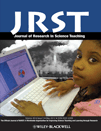
JOURNAL OF RESEARCH IN SCIENCE TEACHING
Elevating Science Teaching Through Scholarly ExcellenceJOURNAL OF RESEARCH IN SCIENCE TEACHING, published by WILEY, is at the forefront of educational research, specifically focusing on the dynamic field of science education. With an impressive Q1 ranking in the education category for 2023 and a percentile of 95th among its peers in Scopus, this journal serves as a critical resource for researchers, educators, and policymakers dedicated to improving teaching and learning practices in science. Established in 1963 and consistently published through 2024, the journal caters to a diverse audience by disseminating rigorous, peer-reviewed research that informs instructional strategies, curriculum development, and assessment techniques. Although it does not currently offer open access, the journal remains a prestigious platform for impactful scholarship in science education, located in Hoboken, NJ. Researchers and professionals alike will find here not only valuable insights but also innovative approaches that are essential to advancing science education in the 21st century.
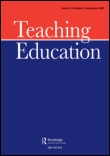
Teaching Education
Transforming learning environments with cutting-edge insights.Teaching Education, published by Routledge Journals, Taylor & Francis Ltd, is a pivotal journal in the field of educational studies, with an ISSN of 1047-6210 and an E-ISSN of 1470-1286. Established in the United Kingdom, this journal has significantly contributed to the discourse on educational theory and practice since its inception in 1987, with a focus on research that enhances teaching methodologies and promotes effective learning environments. With a commendable Scopus rank of 419 out of 1543 in the Social Sciences - Education category, placing it in the 72nd percentile, it attracts a diverse range of scholarly contributions that elevate the quality of education worldwide. Although it does not offer open access, Teaching Education remains an essential resource for researchers, educators, and policy makers interested in the latest developments and insights in educational practices, making it a valuable addition to any academic library.
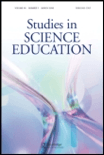
Studies in Science Education
Leading the Charge in Science Education ExcellenceStudies in Science Education is a prestigious journal published by ROUTLEDGE JOURNALS, TAYLOR & FRANCIS LTD, renowned for its commitment to advancing the field of science education. With an impressive impact factor, and categorized in the Q1 quartile within the Education domain, this journal ranks among the top in the field, currently holding the 16th position out of 1543 social science education journals, placing it in the 98th percentile according to Scopus rankings. Since its inception in 1974, it has provided a rigorous platform for researchers, practitioners, and educators to explore, debate, and disseminate significant findings relevant to science education. Although the journal does not offer open access options, it ensures high visibility through its well-curated content, including empirical studies, theoretical discussions, and innovative practices aimed at enhancing educational outcomes in science. By continuously engaging with contemporary educational challenges, Studies in Science Education serves as an essential resource for those dedicated to improving science teaching and learning worldwide.

International Electronic Journal of Mathematics Education
Exploring New Horizons in Mathematics Teaching and LearningInternational Electronic Journal of Mathematics Education (IEJME) is a premier platform dedicated to advancing the field of mathematics education through rigorous research and innovation. Published by MODESTUM LTD, this interdisciplinary journal focuses on the pedagogical, theoretical, and empirical aspects of mathematics education, facilitating a deep understanding of teaching practices, learning methods, and curriculum development. With its commitment to open access, IEJME ensures that research findings are accessible to a global audience, fostering collaborative efforts among educators, researchers, and practitioners. The journal has maintained a commendable position in academic rankings, holding a Rank of #114/399 in General Mathematics and #782/1543 in Education within Scopus, highlighting its significant contribution to the scholarly community. By publishing high-quality research from 2009 to 2016 and 2021 to 2024, IEJME continues to serve as an essential resource for those invested in enhancing mathematical understanding in educational contexts, inspiring future generations of mathematicians and educators.
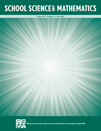
School Science and Mathematics
Inspiring educational innovation at the intersection of science and mathematics.School Science and Mathematics is a prestigious academic journal published by WILEY, focusing on the intersection of education, mathematics, and the sciences. With an ISSN of 0036-6803 and an E-ISSN of 1949-8594, this journal has been a vital resource for educators, researchers, and practitioners since its inception. Indexed in top-tier databases, it boasts impressive Scopus rankings with a Q1 classification in History and Philosophy of Science and a consistent Q2 positions in Education and Engineering, showcasing its impact within the academic community. The journal aims to enhance the teaching and learning of science and mathematics by publishing high-quality, peer-reviewed research that informs best practices and innovative approaches in education. Operating from the United States, it attracts contributions that influence educational strategies and curriculum development across varied disciplines, making it an essential venue for those engaged in advancing knowledge within these fields. Access to its insightful articles can enrich your understanding and drive dialogue among scholars dedicated to improving science and mathematics education.